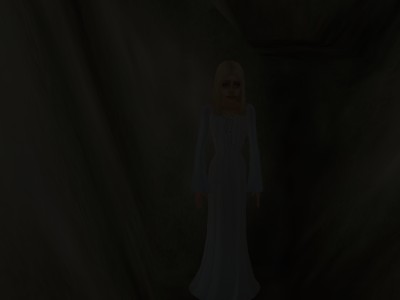
As soon as her feet touched the floor of the cave, Iylaine came back to herself. She was cold, alone, nearly blind, and though she remembered how she had come to be here, she did not know where she was. She did not know how she had dared or how she had managed to climb up there and then down here. And, worst of all, she was wet – wet to the point that water dripped from the tip of her nose, which was the mark for her of utter depravity in terms of wetness.
Now she did not know what to do. She could not imagine herself climbing up the way she had come. A faint light came in from above, but it did not reach far. Her ears only told her of innumerable drops of water falling into countless pools of water all around her in the dark – a hideous sound. She could not get dry here.

And if she could not leave? And if she were never dry again so long as she lived, which would not be long? And if no one ever found her body? And if Malcolm continued to come and splash in the pool far below, while her bones lay all slimy and mold-covered in here?
She began to cry – a miserable, sniveling, childish crying that she would have been too proud to cry before others – but if there had been others around she would not have needed to cry. What had possessed her? Why had no one stopped her? Why had the guards ignored her? Did the people truly care so little for her that they would allow her to walk nearly naked outside in the cold and driving rain of late November?
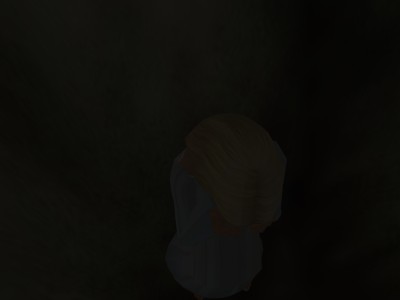
Her crying was like the bleating of a lost ewe. In the narrow cave it echoed strangely, like a lost flock, and still there was that maddening drip-drip into a thousand hidden pools. She screamed once in anguish, trying to cover the sound of the water, but with a secret, mad hope that someone would hear and come to help her. But it would be many months before Malcolm would come to swim here again…
Then, for an instant, she thought she saw the contours of the passage revealed to her eyes. She wondered whether they were growing accustomed to the dark, but the passage flickered into being again and finally solidified. There was light ahead. The passage was solid and unmoving, but the light danced wildly over it. It was the light of a torch.
She sniffed and wiped her nose on her wet sleeve. She would not be seen crying. She hoped that the person had only heard her scream.

She could hear the feet now. The person walked swiftly. He was alone. The light bobbed and flashed on the walls, and then it appeared in the air, lighting the whole of the passage as the person came around a corner. It was too bright and too sudden for her to see much at all, and then she saw a tall man with a brand in one hand and a long, curving knife in the other.
He continued his rapid, angry tread until the globe of light came to wrap her round. He stopped, the light and the knife trembled, and he cried in wonder, “Iylaina?” Then the knife was sheathed, and he ran at her.
Iylaine stumbled back as far as she could, but the wall she had descended was close behind her, and she was trapped.
He stopped before her and dropped his brand. The sudden descent of the light, and then its raking angle from below, made him seem a monster. He held out his arms as if he would grab her, and she screamed a scream that echoed louder than the dripping of the water.
“Cousin!” he cried, nearly laughing, or perhaps nearly sobbing. “Don’t you know me?”
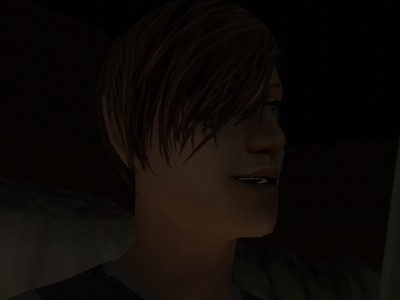
“Vash! Oh!” Now she reached out to grab him.
He had grown so tall – perhaps as tall as her father. She could not reach his neck and had to put her arms around his back. He was nearly a man now, she thought with a pang. He would not care to play with her any longer.
He was laughing at her, an odd laugh that echoed strangely. “You silly girl! Silly little elf! Wet as a fish and naked as a baby mouse!”

He squeezed her against him and stroked her hair and wet gown, and the water began dripping from the tip of her nose and running down her back and legs in earnest. It puddled on the floor at their feet, and the torch went out with a sizzle, but at least she was quite dry.
“Oh!” he laughed as the darkness suddenly returned. “I forgot about that!”
She giggled with him.
“Come with me,” he said, and he released her body and took her hand. “I have a fire, and I suspect you would like nothing more.”
“How did you get here? How did you find me?” she began. “How did I – ”
“Hush!” he laughed. “Wait until I get you in the light again. I want to see just which sort of creature I have before me – fish or mouse, little elf or lady elf.”
“Little lady mouse,” she suggested with a giggle.
“That might be.”
He took her down a narrow, twisting passage that dipped and rose wildly before leveling out and widening into a small chamber. The floor here was dry and seemed too even to be quite natural. And there was a fire, and skins everywhere, and piles of books that looked like men’s books, and sacks and boxes and many other things.
“Do you live here?” she asked in wonder as he pulled her down to sit with him before the fire.
“Live here?” he laughed again and took her hands. “Do you think me a bat, to live in a cave?”

“I think you’re a toad!” she giggled.
“Still calling me a toad, are you, little little elf?” he grinned. “I don’t live here, but sometimes I come here to… pray, I suppose you could say. And at the moment I am here because I am being punished.”
“Were you bad?”
“Oh, very bad.”
“What did you do?”
“That isn’t important. But my father doesn’t even want to look at me at the moment, so I am here. I am supposed to be praying, but I was thinking about you – and now, do you see what happened?” he laughed. “I wished you were here so hard that you came.”

Her eyes went wide. “Truly?”
“How else would you find me?”
“I don’t know. I… woke up, and went out…”
“In your nightgown and your bare feet, too. I’m surprised the men let you.”
“They didn’t see me. I don’t think so. I simply walked past them, and they never looked.”
“No? Hmm. How old are you?”
“You know! I shall be eleven in the spring. But you didn’t come to see me last time!”

“I couldn’t come, little mouse. It was the full moon. I wasn’t here.”
“Where did you go?”
“Too far away to come to see you, I’m afraid. Do you forgive me?”
“I tried to see you on Midsummer Eve, too.”
“Your friend was following you everywhere.”
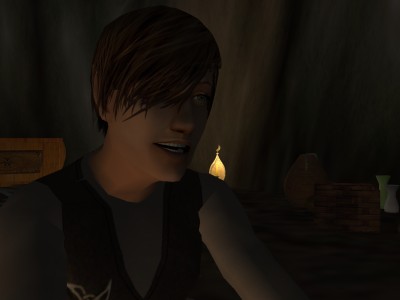
“I know,” she pouted.
“But you’re here now, and no one will find us – not the men and not the elves. What do you think? You might stay all night.”
“It’s already late, though, I think,” she whined, thinking of the lost opportunity.
“We have a few hours. We might make the most of them, if you’re not too tired. But I should like to ask you something first, and then we may talk about what you like.”
“What?”
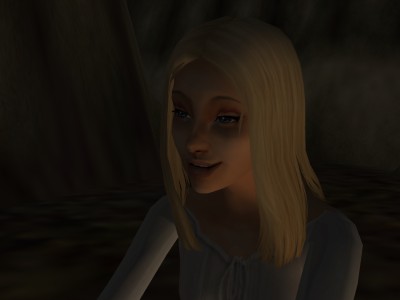
“Have you seen your father recently?”
“No,” she said, instantly sullen. “He had a woman, but she ran away, and that’s all he cares about.”
“She has returned, you know.”

“No, I didn’t.”
“Did you know that she will have a child in the spring?”
Iylaine did not answer. She had not known, and she feared that if she opened her mouth to speak, she would cry.

“Did he tell you anything about her?”
She shook her head, and was grateful that a veil of hair fell and hid the half of her face from him.
“I had better tell you, then, before he does. He will tell you that she is an elf, but she isn’t.”

“An elf?” she gasped.
“No. Not like you and me. She looks like an elf, but it isn’t the same. She is called kisór–it means the lowest of the low. You and I are called khírrón, which means the very high. Do you understand? But your father will only say that she is an elf, because he doesn’t understand the difference.”
“What is the difference?”

“Everything is different. Her people are like animals that talk and wear clothes. They don’t know the names for things, and their idea of religion is simply saying words and making gestures, and they have no history, and they make no plans for the future… they don’t think–they simply eat and sleep and play and bother the rest of us. And they’re dirty, and they have too many babies. And they have no magic.”
“I thought you said there was no magic.”
“I did?”
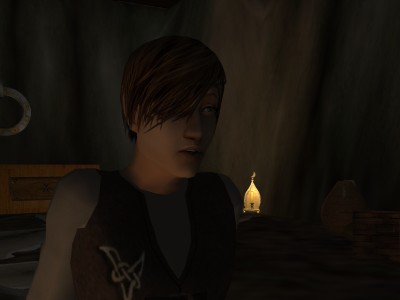
“When I made the branch burn, you said it wasn’t magic, it was only the fire that was already in the branch.”
“That wasn’t magic, but there is magic, you know. Of course! Look.” He picked up a short branch from the pile near the fire, and moments later the entire length of the wood glowed with a soft purple light.
“It’s pretty!” she breathed. “How do you do that?”
“I shall teach you when you are older. For now, it will make our fire pretty,” he said and casually tossed it into the flames.
“Oh!” she wailed, though the branch did continue to glow purple even as it burned.
“Forget about that. I want to talk to you about that kisór and her baby.”

“Oh,” she frowned, remembering.
“You mustn’t go near them. They aren’t fit to look upon you. And if you should chance to meet her, you must see that she kneels before you, or sits or lies on the ground. And she is not permitted to look into your face. If she does, you must slap her.”
“But I couldn’t!” she gasped.
“Of course you could. You smack the dogs when they are bad and try to jump on you.”

“But they’re only dogs.”
“She is only kisór. Blows are the only thing they understand.”
“But my father…”
“Perhaps you will not see your father so often any longer. Such creatures are bewitching to men, who think they are as fine as true elves.”
“But…” She had to stop. Her chin was beginning to tremble, betraying her.
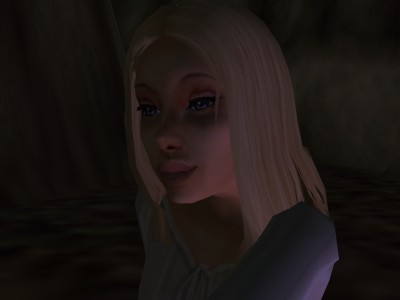
He came to kneel behind her, and he laid an arm over her shoulder and rested his chin lightly on the top of her head. “Don’t cry, little lady mouse. He still loves you. It isn’t his fault. He was lonely, and she saw and took advantage of it.”
“But if he has a little girl or boy that is truly his…” she said, and she felt a tear slip free after all. The way he had said “Don’t cry, little lady mouse,” had seemed rather to be permission to cry.

“You fear he will love it more?” He stroked the tear away with the side of his thumb. “Perhaps he will. But you’re growing into a big lady mouse, and you will soon find someone you love more than your father, don’t you think?”
So she was often reminded. But for now she loved no one more than her father, and it seemed to her that the more she loved, the less she was loved. She too was lonely. She loved her father more than anyone, but he loved someone else more, or soon would.
“It isn’t fair,” she sniffed.
“What isn’t?” he asked softly and sat beside her.
“Everyone loves someone best, but not everyone is loved best by someone.”
He considered this for a moment. “Indeed,” he said and kissed her hair.








Well, looks like the Indian Cast-system is reflected into Elf-society. I hope to learn more about the elves. Where do you get all the information? Or do you make it up yourself?